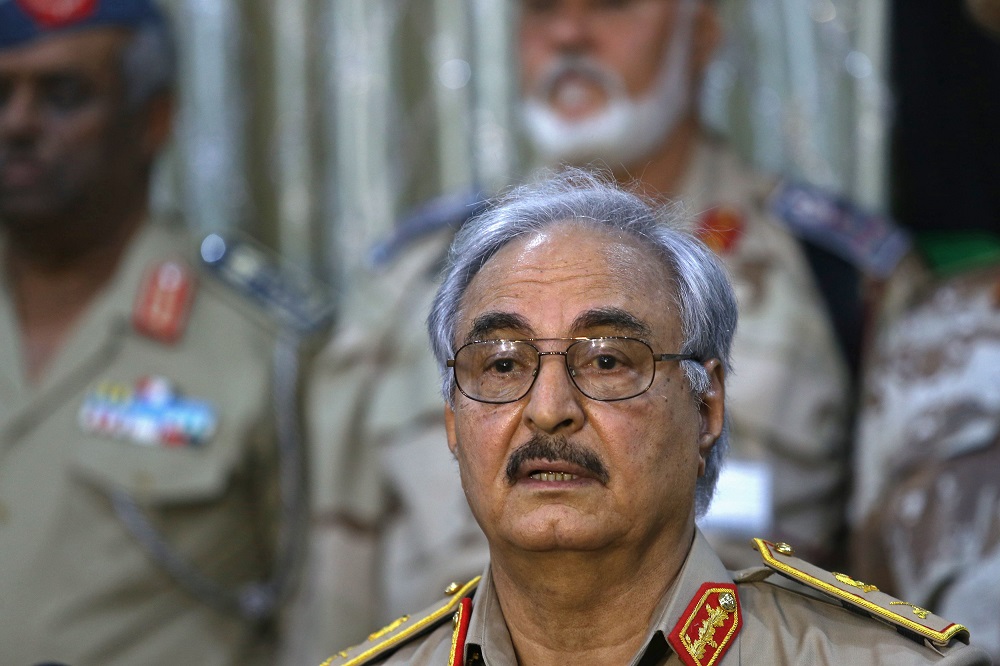Cairo – The National Human Rights Committee in Libya demanded on Thursday that an international investigation be launched in “Qatar’s interference and financial and military support for extremists groups and organizations” in the country.
Commander of the Libyan National Army Field Marshal Khalifa Haftar for his part condemned “Qatar’s terrorist activity on Libyan land,” vowing that it will not go unpunished.
The Committee accused Qatar of backing several local militias, including the al-Qaeda-linked Shura Council of Mujahideen in Derna and Ansar al-Sharia-allied Benghazi Rebels Shura Council. It said that these militias participated in assassinations against hundreds of officers, policemen and soldiers, as well as a number of civilian, media and rights figures in the eastern region.
Qatar is stoking the conflict in Libya through its support of extremist armed groups and political powers that are practicing political violence, added the human rights committee.
This backing has increased the danger and threat of terrorist groups and organizations in Libya, it said.
Qatar’s meddling in Libya’s internal affairs since 2011 has fueled the armed conflict and dragged the country towards civil war and exacerbated the security and humanitarian suffering, it added.
“Qatar’s interference is a blatant violation of the Arab League and United Nations charters in regards to ties between countries and their respect of sovereignty and independence,” it stressed.
Hafter’s media office meanwhile distributed a poster with his photograph that was taken during a military parade held in the eastern region in April. “The terrorist activity that Qatar has carried out on Libyan territories will not go unpunished,” said a statement on the poster.
His office did not say whether the statement was taken from a speech Haftar had delivered during the parade or whether it was a new threat against Qatar.
Haftar had recently delivered a message to the commanders of the army, accusing Qatar and other countries of presenting financial support to terrorist groups in his country.
He stated that the army is monitoring foreign Chadian, Sudanese, African and Arab delegations in the country. These groups had initially arrived there due to poor border control by regional and international powers that support terrorism.
Some of these delegations received sums of money from Qatar and other countries, as well as terrorists active in Libya, he added.
Haftar had since the fall of the regime of Moammar al-Gadhafi in 2011 accused Qatar of backing extremist and terrorist groups. He also said that it has played a negative role in Libya and should be held accountable for its actions.
Meanwhile, the presidential council of the national consensus government announced the establishment of seven military zones in each of Tripoli, Benghazi, Tobruk, al-Kafra, Sabha and two central and western regions.
This controversial step may deepen the disputes with Haftar over the eastern part of the country.
The council, chaired by Fayez al- Sarraj and backed by the United Nations mission, did not explain the reasons that led it to establish the military zones. It was the first time Sarraj signed a decree in his role of high commander of the Libyan army.
In a related development, Haftar’s press office issued a statement that stresses the need to eliminate terrorist groups from al-Jafra region. Sarraj had said that the developments in the area are “unacceptable”.
The military escalation there could lead to the entire failure of the political process, he warned.
In his first comments on Egypt’s airstrikes against terrorist camps in al-Jafra in central Libya, he remarked that he is continuing necessary contacts to restore calm and end the shelling.
He made his statement after holding talks in the capital Tripoli with a delegation from the city of Hun.
He called on “all sides to exercise restraint, halt the military escalation and sit at a dialogue table.”
“The military escalation hinders serious attempts to achieve agreement between the sons of the nation and results in reactions that may lead the country to a new whirlwind of violence and deepen division,” Sarraj declared.
The delegation was informed of the real developments in Hun and Jafra and the damage done by the airstrikes against the infrastructure and public and private properties, said his media office.
For its part, the delegation said that the strikes had struck fear among the people like no other development ever has.
“The Jafra region has never been and will never be a side in the conflict. It has always been a meeting point for all parties due to its location in central Libya,” it stressed.
The residents of al-Jafra had taken to the streets in Hun, demanding that the “Benghazi Defense Brigades” evacuate the area because these militias have destabilized the region.
The protesters carried banners condemning the Muslim Brotherhood and sacked Mufti Sadeq al-Gharyani.
Sarraj later revealed that French Foreign Minister Jean-Yves Le Drian will soon make an urgent trip to Tripoli at the head of diplomatic delegation.
French President Emmanuel Macron had pledged during a telephone conversation with Sarraj to return his country’s diplomatic mission to Libya.
Macron renewed his country’s support for Libya and Sarraj’s government, stressing France’s keenness on establishing security and stability based on political agreement. He added that Paris will work with its European partners in order to help Tripoli overcome its political and security challenges.
